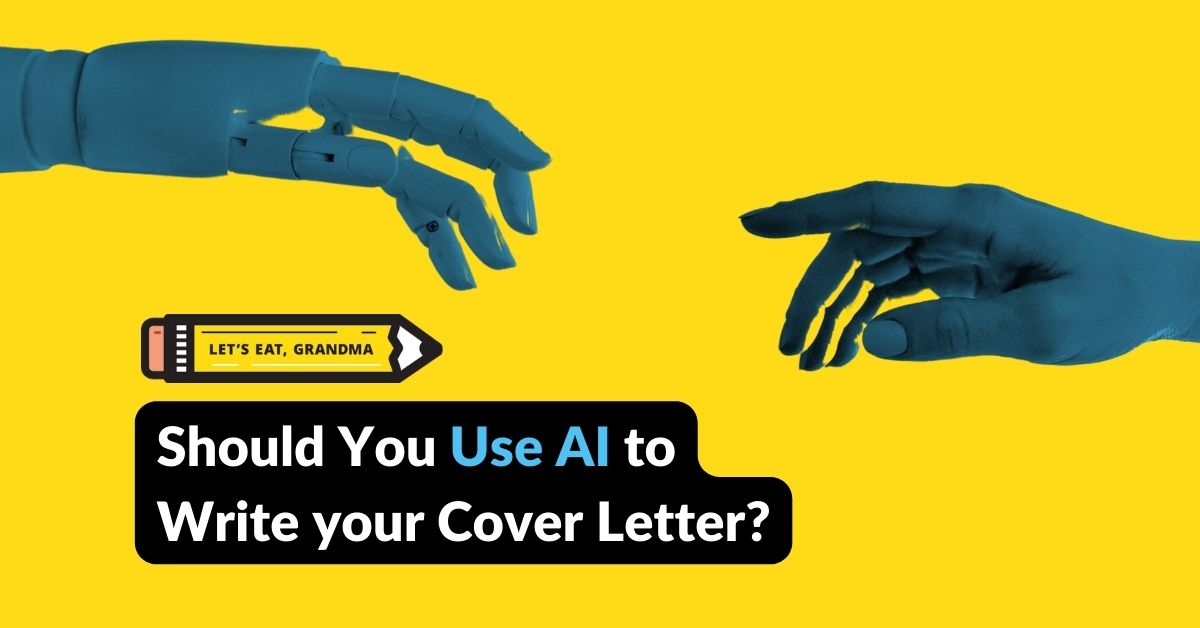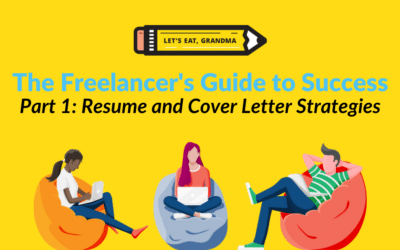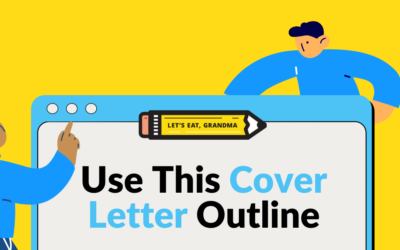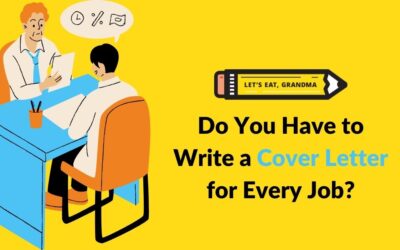ChatGPT is a new Artificial Intelligence (AI) model that has been stirring controversy in the career space, as some job seekers have started to use it for writing their resumes and cover letters.
I’ve been writing for Let’s Eat, Grandma for four years, so I know my way around a cover letter. And while I can see there may be some benefits for using ChatGPT in your job strategy, I want to outline a few red flags to consider before blowing caution to the wind and pumping out AI-generated documents.
In this article, I focus on how using ChatGPT and other AI language generators to write your cover letter could hamper your job search. If you would like to learn more about the impact of ChatGPT on resumes, check out our latest Career Warrior Podcast episode. Additionally, if you would like to see how your resume measures up to industry standards, sign up for our free resume critique where a senior writer (like me!) will review your resume and provide personalized feedback.
So, what is ChatGPT?
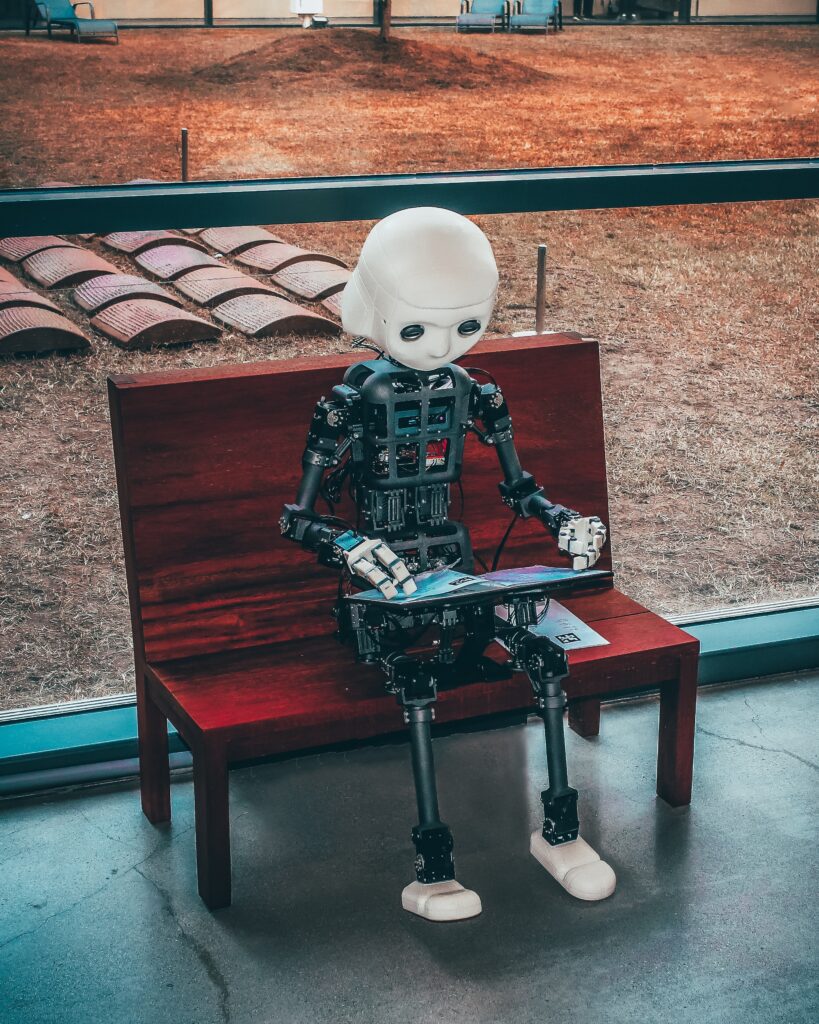
Photo by Andrea De Santis on Unsplash
ChatGPT is the latest technology advancement that is taking the world by storm with its use of AI.
Since the development of computers in the 1950s, the idea of making machines as intelligent as humans has been a topic of interest for various researchers and scientists. As technology has progressed over the years, AI has continued to be a key factor and point of contention.
As Our World in Data shows, over the last 20 years the language and image recognition capabilities of AI systems have increased at a rapid rate.
Likewise, there has also been the recent advancement of natural language generation that utilizes AI programming to produce written or spoken narratives from a dataset. Simply put, this means that with the use of AI-backed natural language generators, a “machine” is capable of producing human-like language or text.
Enter ChatGPT.
ChatGPT is a conversational AI chatbot model created by OpenAI, a San Francisco-based AI research and deployment start-up company, that uses a dialogue format and prompts to create detailed answers about essentially anything.
ChatGPT is truly innovative in that it can quickly solve complex math equations, write you a beautiful song about the birds in the sky, or yes, even write you a cover letter. People have even used it for legal guidance and for summarizing complex research topics.
The possibilities are truly endless when it comes to ChatGPT, and as it continues to grow and “learn,” it will be interesting to see the ramifications of such a tool. However, as it pertains to your job search and writing cover letters there are a few red flags that you need to consider.
The risks of using ChatGPT to write your cover letter
First of all, yes, you still need a cover letter in 2023.
When explaining the purpose of a cover letter, I always like to use the analogy of a sales pitch vs a sales presentation.
Your resume is essentially a sales pitch in that it is a snapshot of your relevant professional experiences. Within 1-2 pages, it shows the reader the value you can bring to your next role and provides them with concise and concrete examples of your achievements for each of your roles.
Your cover letter, on the other hand, is more of a sales presentation. In a cover letter, you have room to expand on a few of your top accomplishments or skills and explicitly explain how they will directly impact the company you are applying for. A cover letter also allows you the opportunity to reflect the tone/voice of the company’s culture, which gives you an extra leg up in showing the reader why you would be a good fit for their organization.
Now that we have covered why cover letters are a crucial part of your job search strategy, let’s go over the potential drawbacks of using ChatGPT and other AI language generators to write that cover letter for you.
1. Lack of personalization & originality

Photo by Hannah Wei on Unsplash
As I stated above, the main value in writing a cover letter is to connect with the reader and show why you would be a good fit for their company. ChatGPT is specifically designed for generating text based on patterns it has learned from large datasets; it is important to note the model has no way of knowing who you really are, what your strengths are, or what makes you unique.
Personalization is key to standing out in the job market. Anyone and everyone can write a decent generic, cookie-cutter cover letter, yes even ChatGPT. But ultimately, this just makes you look like any other job applicant. Why would you want to do that?
One of my favorite parts about professional cover letter writing is digging deep into my client’s experience to really pinpoint what their strengths are and extrapolate how these specific skillsets directly apply to their next role.
Through our discussion in the consultation, I can also identify interesting and unique examples of how they’ve used these skillsets in their career.
Often these clients have never even thought about using these examples in the cover letter – and if they haven’t, ChatGPT won’t either.
For example, let’s say you’re a recent software engineer college graduate without any previous work experience looking to write a cover letter.
I used ChatGPT to write a cover letter using the above parameters, and within seconds the model spit out a generic template that includes lines such as:
I have gained a deep understanding of programming languages, data structures, algorithms, and software development methodologies.
I have also completed several projects, both individually and as part of a team, that have sharpened my problem-solving, communication, and collaboration skills.
At first glance, this seems pretty decent, and you may be happy with the outcome. However, this kind of generic language doesn’t help you stand out at all. I can guarantee every single software engineering college student has gained the same skills listed above and has also completed various projects focused on critical and analytical thinking skills.
So this is where I come in.
Instead of regurgitating information that everyone else has experienced, I work directly with you in to identify specific projects you have completed during your studies. This includes outlining a specific project goal, your direct role, the process & methods used, and what you ultimately achieved through the project or course. In addition, we would look at the different tools you used and determine how best to show how your hands-on experience can be directly applied to your new role where a similar tool may be a necessary job requirement.
By expanding on a few concrete examples and minimizing the excess fluff, you add merit to your candidate profile while motivating the hiring manager to keep reading to learn more about you.
2. Lack of customization

Photo by Chris Fowler on Unsplash
Building on the point above, the key to an effective cover letter is tailoring the document to a specific job position and company.
A well-written, memorable cover letter explains why you are interested in the role and how your relevant skills and experiences align with the company’s mission and goals.
Once again, this is a personalized component that an AI-generated cover letter is simply not capable of conveying, as the models use general templates for producing text.
In addition, since ChatGPT lacks an emotional element, there is a high possibility that it may write the cover letter in the wrong tone, and the tone of your document is absolutely critical.
For example, often a job description may specifically mention the company is looking for someone with a strong sense of empathy or a high regard for emotional intelligence. Sure, you can say you have these qualities. But anyone can say that!
It’s much more effective to show you have these qualities through your word choice and the examples of past actions you provide. While the ChatGPT language model attempts to mimic a human tone, it’s incapable of human emotions, and thus the tone of the document can come across as impassive, detached, flat, and passionless.
Instead of churning out generic cover letters, I always make sure my client’s cover letter is captivating and expresses a genuine interest in the company that my clients are applying for. I sincerely believe this genuine interest can only come through in cover letters written by a human – whether that human is you, me, or another professional cover letter writer.
3. Potential for inaccuracy and errors

Photo by JESHOOTS.COM on Unsplash
One of the biggest challenges when using ChatGPT to write your cover letter is that while it can produce human-like text, it can (and will) make mistakes or assumptions that could harm your chances of moving forward in the job hiring process.
Additionally, like any language model, ChatGPT is not perfect and can make grammatical errors. Because ChatGPT may not always understand the context or nuances of a specific industry or profession, it could produce language for your cover letter that is unprofessional or inappropriate.
As a blog on the OpenAI website states:
ChatGPT sometimes writes plausible-sounding but incorrect or nonsensical answers.
The blog also confirms that the model “is often excessively verbose and overuses certain phrases.”
“Excessively verbose” is a big no-no for cover letters!
When using ChatGPT, you supply the model with information or prompts that it then uses to build out answers that will potentially align with what you are looking for. However, it is uncommon for the model to ask for clarification, and it won’t ask you to expand on your professional accomplishments. The cover letter will be written based on patterns from existing datasets. If ChatGPT needs to fill in any gaps, it could use information that is not applicable to your experience, or it could even include false or misleading information.
Sending something that’s inaccurate, or worse, “nonsensical,” to a potential employer could be pretty embarrassing.
In conclusion, these are just a few of the key issues to be aware of when considering using ChatGPT to write a cover letter for your job search. While the AI model is capable of producing a decent generic template/outline of a cover letter, it ultimately lacks value as it undermines your professional background.
Of course, you could potentially use the AI-generated cover letter as a base and then go through and add your own information to it. But this method could end up taking a lot of time and effort, and trying to create the right prompts to tweak the language until it’s just right can be frustrating. At the end of the day, ChatGPT is just a machine and will never fully “understand” your needs or requests.
At Let’s Eat, Grandma, our writers work directly with you in crafting an effective and tailored cover letter that captures your unique career journey while highlighting your necessary experiences and skills as they pertain to your job search. Every package includes a video consultation so you can connect 1:1 with your writer to clearly communicate your career goals.
Request a free resume critique today for honest feedback from a senior resume writer on your resume, and take the first step toward securing your dream job.

